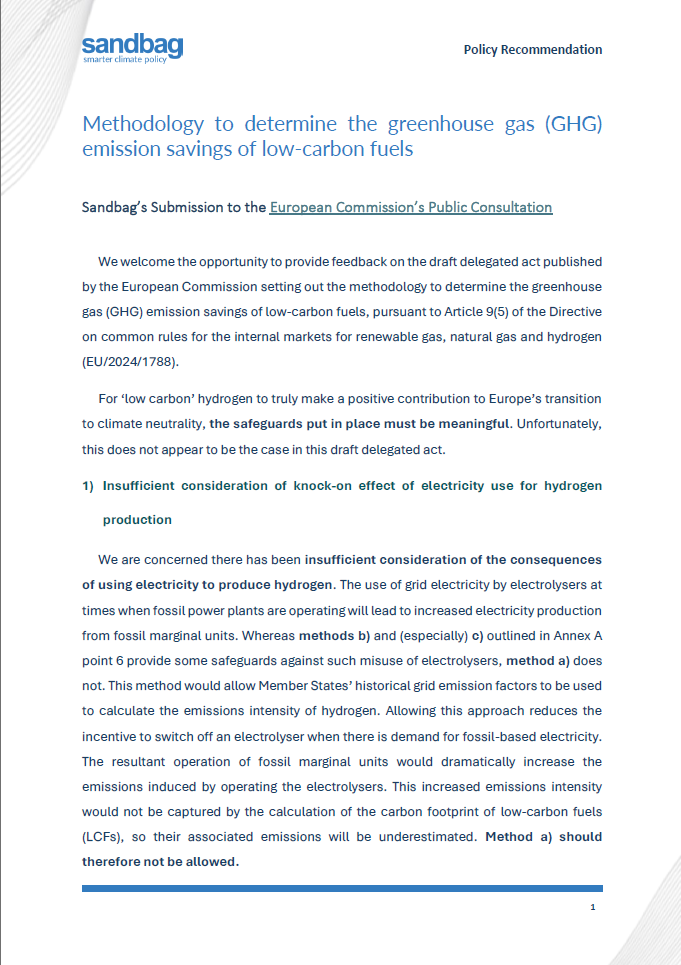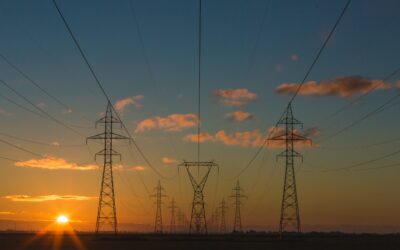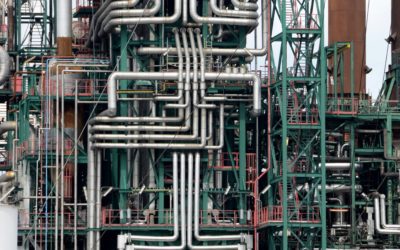On 25 October 2024, we provided feedback on the European Commission’s draft regulation for establishing a methodology to determine greenhouse gas (GHG) emission savings of low-carbon fuels.
The current draft has several issues that need addressing to ensure it will help achieve the European Union’s climate goals.

We welcome the opportunity to provide feedback on the draft delegated act published by the European Commission setting out the methodology to determine the greenhouse gas (GHG) emission savings of low-carbon fuels, pursuant to Article 9(5) of the Directive on common rules for the internal markets for renewable gas, natural gas and hydrogen (EU/2024/1788).
For ‘low carbon’ hydrogen to truly make a positive contribution to Europe’s transition to climate neutrality, the safeguards put in place must be meaningful.
Unfortunately, this does not appear to be the case in this draft delegated act.
Insufficient consideration of knock-on effect of electricity use for hydrogen production
We are concerned there has been insufficient consideration of the consequences of using electricity to produce hydrogen.
The use of grid electricity by electrolysers at times when fossil power plants are operating will lead to increased electricity production from fossil marginal units. Whereas methods b) and (especially) c) outlined in Annex A point 6 provide some safeguards against such misuse of electrolysers, method a) does not.
This method would allow Member States’ historical grid emission factors to be used to calculate the emissions intensity of hydrogen. Allowing this approach reduces the incentive to switch off an electrolyser when there is demand for fossil-based electricity. The resultant operation of fossil marginal units would dramatically increase the emissions induced by operating the electrolysers. This increased emissions intensity would not be captured by the calculation of the carbon footprint of low-carbon fuels (LCFs), so their associated emissions will be underestimated. Method a) should therefore not be allowed.
The draft delegated act also states that the possibility of allowing low-carbon electricity to be sourced directly from nuclear power plants will be reviewed in 2028. Diverting low-carbon electricity generation from the grid at times when the grid is not fully decarbonised would result in increased emissions and should not even be considered.
Underestimation of emissions associated with fossil gas-derived hydrogen
For fossil-derived hydrogen, explicitly excluding the combination of Carbon Capture and Storage (CCS) with enhanced oil recovery is a welcome reassurance, as is including only Carbon Capture and Utilisation (CCU) in which CO2 is permanently chemically bound in products, something we recently advocated for.
However, upstream leakage has been significantly underestimated in the draft. The ‘standard values’ for upstream GHG emissions for natural gas total 10.45 gCO2eq/MJ (corresponding to a 1.1% leakage rate). Agora recently showed a similar value (9.7 gCO2eq/MJ) would significantly underestimate real-world emissions from fossil-based hydrogen by a factor of 2.5 for Europe by 2040. The proposed value needs to be raised to reflect recent studies, which highlight that a 3% methane leakage rate is a more realistic value. Alternatively, country-specific emissions factors could be used until site-specific rules under the EU Methane Regulation come into effect.
Additionally, the draft delegated act does not specify how midstream emissions will be accounted for in the case of natural gas-derived hydrogen, merely labelling them as ‘not applicable’ (Table B). This is despite the fact that midstream emissions are included in the scope of the EU Methane Regulation.
Photo by Marco from Pexels.
Related publications
EU Criteria for Green Hydrogen: How They Could Increase Relience on Thermal Power and Hijack the Energy Transition
On February 13th 2023, the European Commission released two pieces of legislation to provide criteria defining renewable hydrogen products. The so-called Delegated Acts matter because they set out how to comply with other regulations under review which will force ships, aircraft and heavy industry to use a minimum content requirement of the fuel, such as the Renewable Energy Directive, REFuelEU Aviation and FuelEU Maritime.
Preventing double counting: Sandbag challenges methodology on green hydrogen (RFNBO).
Sandbag welcomes the opportunity offered by the European Commission to provide feedback on the...
Untangling the knots – Clearing the way to fast green hydrogen deployment
As the EU and some of its Member States are piling up subsidy schemes to try and kickstart a...



